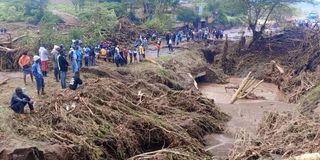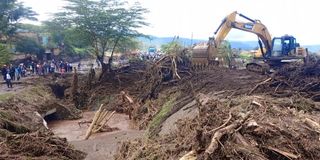Experts reveal devastating impact of Maai Mahiu tragedy on agriculture

A banana tree lies outside one of the homesteads that was affected by floods in Maai Mahiu on April 30, 2024.
The Maai Mahiu tragedy has left an extensive trail of destruction that extends far beyond the loss of human lives.
Mtaa Wangu has learnt that the catastrophe has wreaked havoc on the region's agricultural landscape, leading to the loss of livestock and destruction of crops.
According to a soil expert, the over-spillage of water due to gravity in the low-lying areas that caused the formation of a hole-like structure, only denotes that the ability of soil particles to resist breakdown and maintain their structure when subjected to external forces was very low.

Residents of Maai Mahiu look line up along a deep gulley that was formed after flood waters swept across the land on April 30, 2024.
Mtaa Wangu found out that the affected area was predominantly agricultural, with many farmers actively planting and tending to their crops.
Farmers had established maize, beans, tomatoes, French beans, onions, and avocado crops and were also practicing livestock keeping with some rearing cows, goats, poultry, dairy goats and sheep.
Paul Soita, CEO and Founder of Shamba Culture Agricultural Services, notes that with the kind of destruction experienced, farmers may be unable to resume their normal agricultural activities, unless they plant hardy crop varieties like sisal that can be used for land reclamation.
“One of the short-term effects of the tragedy in the area’s agricultural landscape, is that the topsoil has been swept away, and what is remaining is a mixture of gravel or rock particles making the land not arable," he explains.
He also notes that since farmers in the area had planted and were in the fertilizer application stage of the crop, the undissolved fertilizer has been washed away and may cause eutrophication (the process in which a water body becomes overly enriched with nutrients, leading to the plentiful growth of simple plant life e.g. algae) if the water were to end up in a water body.

An excavator combs through trees and mud in an attempt to open up a drainage system on April 30, 2024.
According to Mr Soita, such a catastrophe may affect the farming community psychologically, and may lead to them abandoning the area entirely, as they may associate it with death.
For the people of Maai Mahiu, it will be a daunting task, rebuilding their farms and restoring the land to its former productivity.
